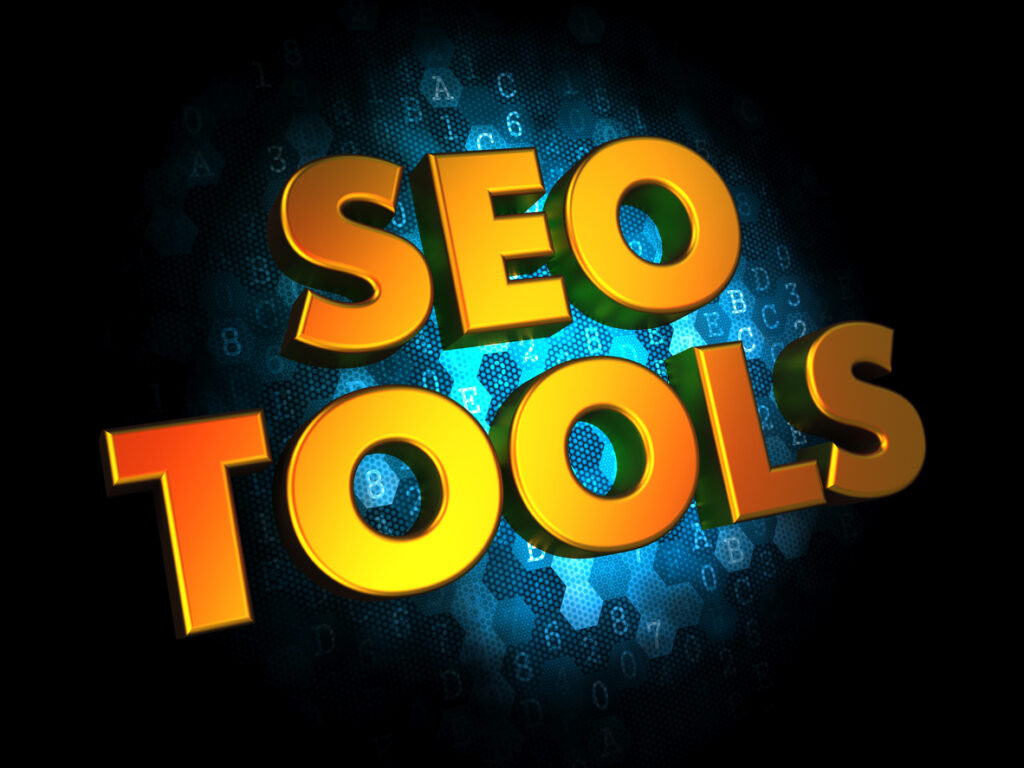
The dream is simple—dominating search rankings, scaling organic traffic exponentially, and fueling your startup’s growth engine without draining your runway. Your team is building an innovative product while you visualize outranking established competitors on that coveted first page. But then, reality hits. You start researching enterprise SEO platforms, and the prices are staggering—$199/month? $499/month? $1,200/month?!
How can these tools cost so differently when your marketing budget is already stretched thin?
Suddenly, your growth ambitions feel constrained by financial reality, and you’re lost in a sea of enterprise pricing tiers that seem designed for companies 10x your size.
Sounds familiar, huh? You’re not alone.
According to recent startup benchmarks, high-growth companies that implement effective SEO strategies see customer acquisition costs (CAC) up to 61% lower than paid channels, while generating 3-5x higher conversion rates. In the race to product-market fit and beyond, that efficiency can mean the difference between rapid scaling and running out of runway.
But here’s the challenge: Premium SEO platforms are typically priced for established enterprises, not resource-constrained startups burning cash to capture market share. In fact, the average cost of enterprise SEO software ranges from $199 to $1,200 per month—a substantial chunk of a seed-stage marketing budget.
But here’s the thing: It doesn’t have to be.
This guide will show you exactly which affordable SEO tools can deliver enterprise-level insights at startup-friendly prices, how to maximize ROI from minimal investment, and the common budget traps that growth marketers fall into. By the end, you’ll have a clear roadmap to SEO success that preserves your runway while accelerating your growth trajectory.
Let’s dive in.
What Makes an SEO Tool Worth the Cost for High-Growth Startups?
So, you’re staring at those enterprise pricing tiers and wondering, what’s going on here? Your startup needs powerful SEO capabilities, but not at the cost of extending your runway.
Let’s take an inside look at what makes an SEO tool worth your precious startup capital.
Scalability vs. Immediate Needs
For startups, the ideal SEO tool grows with you through these critical stages:
Pre-PMF: When you’re validating product-market fit, you need basic insights without major expense. Initial Traction: As you begin scaling, deeper competitive analysis becomes crucial. Hypergrowth: Only at this stage do you need enterprise-level data sets and advanced features.
Any effective SEO strategy for startups depends on certain core functionalities:
Keyword Research: Identifying product-led terms and category-defining phrases your target market is searching for.
Competitive Gap Analysis: Finding content opportunities your larger competitors have missed.
Backlink Intelligence: Understanding link-building opportunities to accelerate domain authority.
Rank Tracking: Monitoring how you’re performing against established players. Technical Foundation: Ensuring your site architecture supports rapid scaling.
Think of it like this— Want comprehensive keyword data across 50 countries? That’s valuable, but does an early-stage startup with one primary market need that global coverage yet? Need backlink analysis? At your stage, understanding the strategy behind competitor backlinks is more valuable than seeing every single link.
What this means for you: Choose tools with flexible pricing tiers that allow you to access essential features now, while providing a clear upgrade path as your traffic and team scale.
Team Adoption & Workflow Integration
For resource-constrained startups, the most powerful tool is useless if your lean team can’t quickly integrate it into existing workflows. Many affordable tools excel at simplifying complex SEO concepts with API connections and intuitive interfaces.
According to Y Combinator advisors, startups with streamlined marketing tech stacks demonstrate 31% higher growth rates than those juggling multiple disconnected tools.
What this means for you: Prioritize tools that integrate with your existing stack (Slack, Notion, Google Data Studio) and provide actionable insights without requiring dedicated SEO specialists.
Free vs. Paid: The Startup Runway Equation
Now, here’s the harsh truth for founders:
Free tools = preserve runway but often limit scaling potential. Premium tools = accelerate growth but can significantly impact burn rate. Budget-friendly paid tools = the sweet spot for most pre-Series B startups.
For example, Google’s free tools provide essential baseline data, but competitive intelligence—crucial for market positioning—requires some level of investment. The question isn’t whether to pay, but how to maximize ROI at each funding stage.
What this means for you: Use free tools to establish baseline metrics, then strategically invest in affordable paid options that directly support your current growth objectives and fundraising narrative.
Best Cheapest SEO Tools for High-Growth Startups in 2025
Okay, so now you understand what makes an SEO tool worth your startup’s limited resources. But which specific tools offer the best ROI for high-growth companies? Here’s our carefully researched breakdown of the most cost-effective options that still deliver the competitive intelligence you need.
1. Serpstat (Entry Plan)
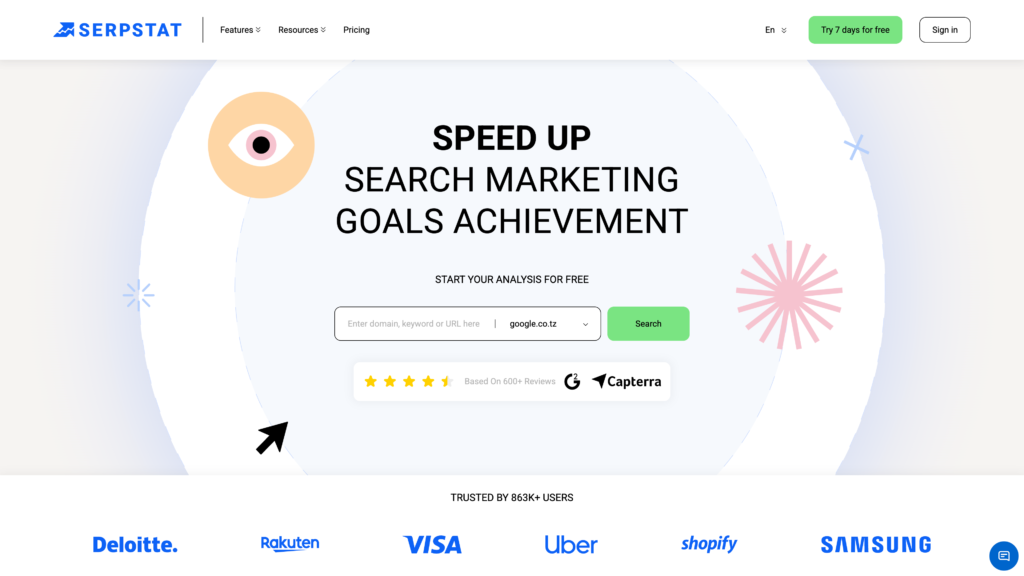
Features: Keyword research, rank tracking, site audit, backlink analysis, and competitive intelligence Pricing: Lite plan starts at $69/month (or $55/month billed annually) Best for: Pre-seed to Series A startups with aggressive growth targets
Serpstat has emerged as the secret weapon for scaling startups due to its comprehensive competitive analysis capabilities at a fraction of enterprise prices.
The Lite plan includes:
- 4,000 queries per day
- 15,000 results per report
- 10,000 analyzed URLs
- 5 projects
- 500 keyword tracking positions
What makes it valuable for startups: Serpstat excels at uncovering competitor strategies and market gaps—critical intelligence for startups looking to disrupt established players.
Case Study: A B2B SaaS startup in the project management space used Serpstat to analyze three entrenched competitors, identifying untapped keyword opportunities and content gaps. Implementing these insights resulted in a 178% increase in organic traffic within 4 months and a 32% reduction in CAC from paid channels.
“As a startup competing against publicly-traded companies, we needed to be smarter about our SEO. Serpstat let us see exactly where the giants were vulnerable and target those opportunities specifically.” – Alex T., Growth Lead at TaskFlow
2. SE Ranking (Optimum Plan)
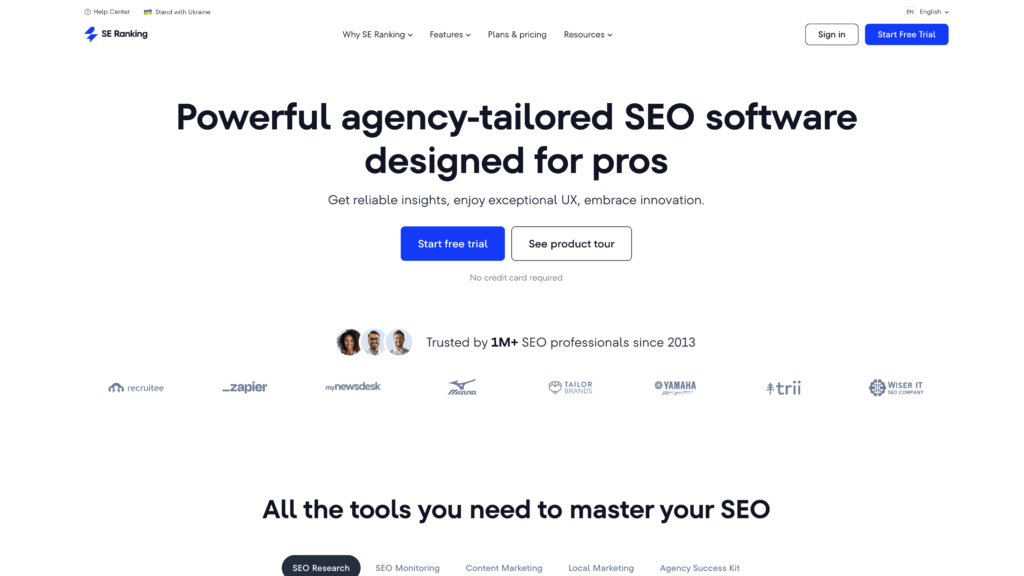
Features: Comprehensive SEO platform with keyword research, rank tracking, site audit, backlink analysis, and competitor research Pricing: Plans start at $39/month (or $31.20/month billed annually) Best for: Seed to Series A startups building their first dedicated growth team
SE Ranking provides an all-in-one SEO solution with pricing tiers that scale sensibly with startup growth trajectories.
The Optimum plan includes:
- 1,000 keywords to track
- 25 competitor metrics
- 100,000 backlinks to check
- 150,000 pages to audit
- Custom reporting features
- White-label capabilities
What makes it valuable for startups: SE Ranking offers enterprise-level features with startup-friendly onboarding and scalable pricing. Their API access and white-label reporting are particularly valuable as your team and reporting needs grow.
Case Study: A fintech startup preparing for Series B switched from using multiple disconnected tools to SE Ranking’s centralized platform. Their three-person growth team saved 15 hours weekly on SEO tasks while improving organic lead quality by 41%, directly supporting their fundraising narrative.
“We needed to demonstrate efficient growth metrics before our Series B. SE Ranking gave us enterprise-quality insights at about 30% of the cost, which both improved our metrics and extended our runway.” – Maria K., CMO at PayCircle
3. Ubersuggest (Enterprise Plan)
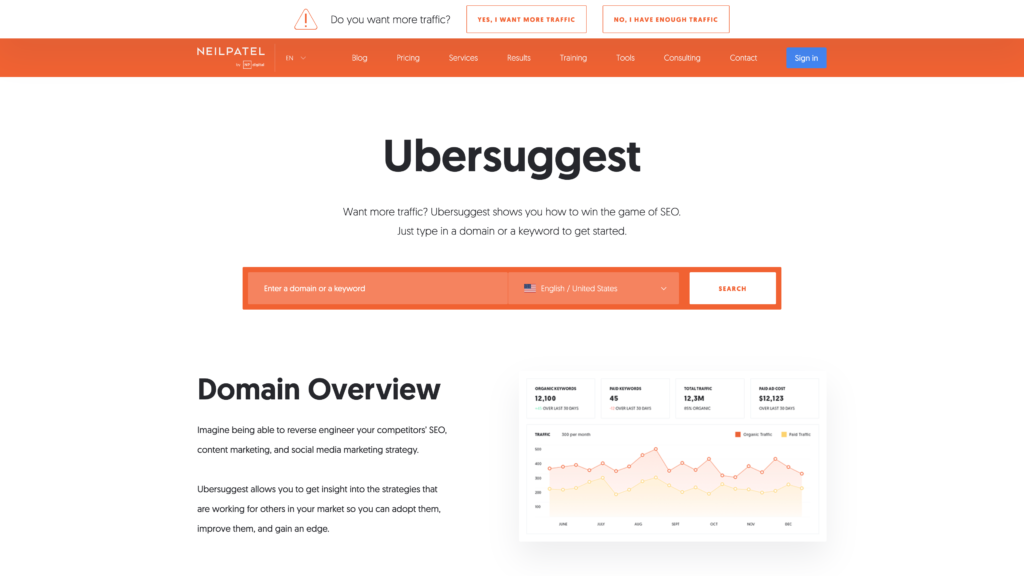
Features: Keyword research, site audit, backlink analysis, rank tracking Pricing: Free version + paid plans starting at $29/month (or lifetime access from $290) Best for: Pre-seed startups and technical founders wearing multiple hats
Ubersuggest offers a compelling proposition for early-stage startups: lifetime access for a one-time fee, eliminating the subscription burden from your runway calculations.
The Enterprise plan (lifetime) includes:
- Unlimited daily searches
- 7 projects
- 3 years of historical data
- Rank tracking for 2,500 keywords
- Priority support
- One-time payment of $590
What makes it valuable for startups: Ubersuggest provides founder-friendly pricing with their lifetime deal option—a rare find in SaaS-dominated SEO tools. For cash-conscious startups, this predictable cost structure removes the anxiety of yet another monthly subscription.
Case Study: A bootstrapped SaaS startup with two technical co-founders used Ubersuggest’s lifetime plan to implement a content-led growth strategy. With no dedicated marketing hire, they leveraged the tool’s simplified interface to identify strategic keywords, resulting in a 400% organic traffic increase in their first year and $27K in monthly recurring revenue directly attributed to organic search.
“As technical founders, we needed something intuitive that didn’t require an SEO specialist. The one-time payment model was perfect for our bootstrap approach, letting us allocate subscription budgets to other growth channels.” – David Y., Co-founder at DataSync
4. Mangools (Premium Plan)
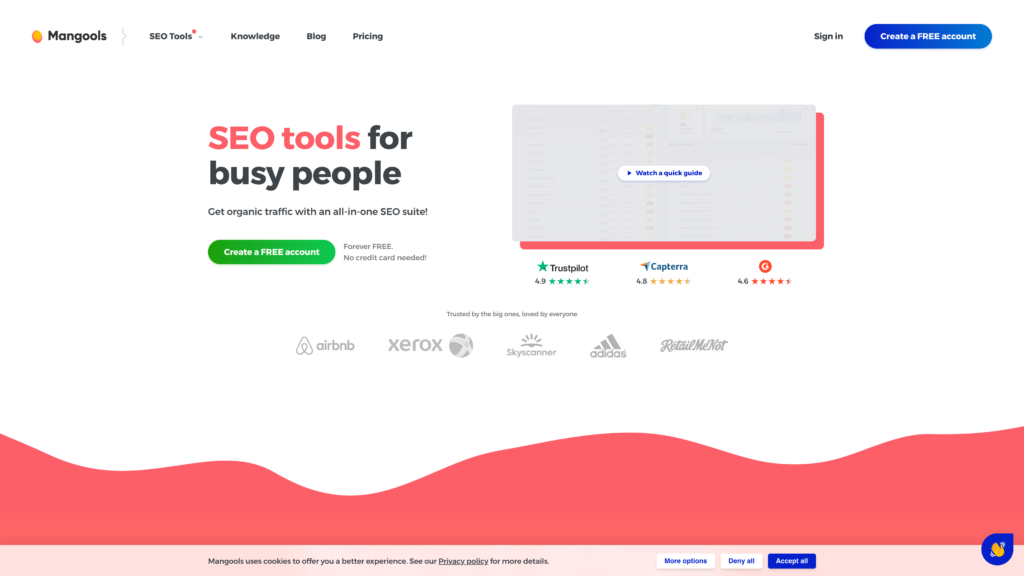
Features: KWFinder for keyword research, SERPWatcher for rank tracking, LinkMiner for backlink analysis Pricing: Premium plan at $69.90/month (or $39.90/month billed annually) Best for: Series A startups building dedicated content operations
Mangools offers a suite of five interconnected tools that cover all essential SEO needs with exceptional UX design—critical for fast-moving startup teams.
The Premium plan includes:
- 500 keyword lookups per 24 hours
- 700 SERP lookups per 24 hours
- 700 tracked keywords
- 20,000 backlink rows per 24 hours
- 500 site lookups per 24 hours
What makes it valuable for startups: Mangools excels at visualizing complex SEO data with minimal learning curve, enabling cross-functional team adoption without specialized training.
Case Study: An AI startup with rapid release cycles used Mangools to coordinate content strategy across product, engineering, and marketing teams. Their collaborative approach to keyword targeting led to a 217% increase in product signups from organic channels within two quarters.
“Our product roadmap moves too fast for traditional marketing silos. Mangools allowed our engineers and product managers to directly contribute to SEO strategy without specialized training, which accelerated our content-to-product feedback loop.” – Sarah L., Product Marketing at AIAssist
5. Free SEO Tools Worth Considering for New Startups
For pre-seed startups with extreme budget constraints, these free tools can establish your SEO foundation:
Google Search Console + Google Analytics 4
- Essential for establishing baseline organic performance
- Provides direct integration with Google’s ranking systems
- Zero cost with unlimited usage
- Offers conversion tracking and user journey analysis
Keywords Everywhere (Chrome Extension)
- Browser extension that adds volume data to Google searches
- Free tier provides essential metrics
- Displays related keywords and “people also search for” data
- Perfect for initial keyword discovery
Ahrefs Webmaster Tools (Free Version)
- Limited version of the enterprise platform
- Provides site audit and basic backlink data
- Shows top-performing keywords for your domain
- Identifies critical technical issues
Semrush SEO Writing Assistant (Free Browser Version)
- Content optimization suggestions based on top-ranking content
- Readability and SEO recommendations
- Limited free version still delivers value for startup content
GitHub + Screaming Frog (Free Version)
- Open-source SEO code solutions via GitHub
- Screaming Frog crawls up to 500 URLs for free
- Identify technical issues before they impact growth
- Perfect for technical founders to integrate SEO into development workflows
How to leverage free tools in a high-growth startup:
- Establish baseline metrics and conversion tracking with Google’s tools
- Use Ahrefs Webmaster Tools for monthly technical audits
- Conduct keyword discovery with Keywords Everywhere during customer interviews
- Optimize high-priority content with Semrush’s Writing Assistant
- Document findings in a shared growth repository for institutional knowledge
This zero-cost stack can sustain your SEO foundation through early validation stages, allowing you to defer paid tools until you have proven traction and clearer budget allocation.
Startup Mistakes That Burn SEO Budget and Runway
Look, we’ve all been there. You’re building fast, you’re optimistic about growth, and you think, “We need the best tools to compete with established players.” But when it comes to SEO tools, enterprise FOMO can lead to wasted runway. Budget disasters don’t happen by accident in startups—they happen because of avoidable strategic errors.
If you want to preserve cash while maximizing growth, don’t fall into these traps.
Copying Enterprise Tool Stacks Without Adaptation
We get it—when you’re reading growth blogs from unicorns or public companies, it’s tempting to assume you need the same enterprise-grade tools they use. Wrong.
Those tool recommendations rarely account for the unique constraints of early-stage companies:
Common runway-burning mistakes:
- Subscribing to $500/month platforms when you’re pre-revenue
- Purchasing full-team licenses when one shared account would suffice
- Paying for global data when you’re focused on a single market
- Investing in sophisticated features your lean team lacks time to utilize
Remember, the best tool stack for a startup is one that delivers immediate value toward your current growth objectives—not what some Series D company is using post-IPO.
Building “Growth Stacks” Instead of Growth Processes
It happens to the best founders.
You get Tool A for keyword research, Tool B for content optimization, Tool C for rank tracking, Tool D for reporting… before you know it, you’re spending $500/month on disconnected tools while your actual execution lags.
Every time a growth advisor says, “You should try this new tool,” your burn rate threatens to increase without corresponding output.
Successful startup SEO requires process first, tools second. Establish clear workflows, then select the minimal viable toolset to support them.
Misaligning SEO Investment With Funding Stage
These are the costs that get scrutinized in board meetings.
At pre-seed: Free tools + maybe one core paid tool At seed: Strategic investment in 1-2 core platforms At Series A: Expanded capabilities aligned with team growth At Series B+: Enterprise tools justified by proven ROI
That “70% discount for annual billing” looks tempting regardless of stage, but committing to 12 months before product-market fit is established is a common cash flow mistake that haunts founders.
Don’t let these subscription traps drain your runway. Align tool investments with your funding stage and prioritize monthly plans until you’ve proven channel economics.
Neglecting Data Portability and Platform Lock-In
Famous last words of an excited founder:
“We’ll switch tools when we outgrow this one!”
Listen, SEO data accumulation is valuable intellectual property for your startup. Historical rankings, custom keyword lists, and competitive benchmarks represent months of work.
Many affordable tools lack robust export capabilities or API access, potentially forcing you to either:
- Stay with an inadequate platform as you scale, or
- Lose months of historical data when upgrading
Prioritize tools with complete data export options and API access from day one, even if you don’t need them immediately.
But the good news? These mistakes are preventable.
By aligning tool investments with your current growth stage, focusing on processes before tools, and planning for platform transitions, you can optimize your SEO efforts without compromising runway.
Strategic Framework: Matching SEO Tools to Your Startup Stage
The most efficient SEO investment strategy aligns tool capabilities directly with your growth stage. Here’s how to approach this strategic alignment:
Pre-Seed / MVP Stage
Primary SEO Goal: Validate organic channel potential, establish baseline presence
Recommended Tool Investment: $0-$69/month
- Core Tools: Google Search Console, Google Analytics, GitHub Repos
- Optional Paid Tool: One-time purchase of Ubersuggest lifetime plan ($290-$590)
Strategic Rationale: At this stage, product development consumes most resources. Free tools provide essential visibility while conserving runway. If investing, prioritize one-time purchases over recurring subscriptions until channel viability is proven.
Seed Stage / Initial Traction
Primary SEO Goal: Build foundation for scalable organic growth, prove channel economics
Recommended Tool Investment: $100-$200/month
- Core Stack: Serpstat Lite ($55/mo annually) OR SE Ranking Basic ($31/mo annually)
- Specialized Need: Surfer SEO Basic ($49/mo) for content optimization if content is a primary channel
Strategic Rationale: With initial product-market fit indicators, limited investment in one comprehensive platform is justified. Choose tools with broad functionality over specialized solutions, as versatility supports experimentation across SEO tactics.
Series A / Growth Acceleration
Primary SEO Goal: Systematic scaling of proven organic strategies, competitive differentiation
Recommended Tool Investment: $200-$500/month
- Core Platform: SE Ranking Optimum ($71/mo annually) OR Serpstat Standard ($119/mo annually)
- Team Enablement: MarketMuse Standard ($149/mo) for content teams OR Clearscope Essentials ($170/mo)
Strategic Rationale: With proven traction and dedicated marketing headcount, investment in both comprehensive analytics and specialized content optimization becomes justified. Prioritize tools with collaboration features as your team expands.
Series B+ / Market Expansion
Primary SEO Goal: Maximize market share, international expansion, enterprise-grade analytics
Recommended Tool Investment: $500-$1,000+/month
- Consider Upgrading: Ahrefs ($399+/mo) OR Semrush ($229+/mo) for enterprise capabilities
- Maintain: Specialized tools with accumulated historical data
Strategic Rationale: With substantial revenue and proven channel economics, enterprise tools with advanced capabilities become justified. Evaluate each tool against ROAS rather than absolute cost, as your ability to leverage sophisticated features increases with team expansion.
Remember, every dollar saved on unnecessary tool subscriptions extends your runway—potentially by weeks or months. Choose wisely and upgrade strategically when growth metrics justify the additional expense.
Should You DIY Your SEO or Invest in an Agency Partner?
Alright, you’ve got the tools and the strategic framework. Now, the big startup question: should your lean team handle SEO execution in-house, or should you partner with an agency?
When DIY Makes Sense for Startups
For early-stage startups with technical founders or a growth marketer on the team, managing SEO in-house is often practical. This approach works best when:
- You have a team member with SEO experience or aptitude
- Your product serves a niche market with specialized knowledge your team possesses
- Cash conservation is a higher priority than growth velocity
- You’re pre-product-market fit and still defining positioning
This approach gives you maximum control and helps build institutional knowledge, but progress may be slower as your team juggles multiple priorities.
The DIY stack typically includes:
- One comprehensive but affordable SEO platform
- Free Google tools for baseline metrics
- Occasional specialized tools when specific needs arise
“We knew our market better than any agency could, so we kept SEO in-house during our seed stage. Using affordable tools like Serpstat and establishing clear processes let us build a strong foundation before scaling with agency help post-Series A.” – Jamie R., Founder at DevMetrics
When an Agency Partnership Is the Smart Move
For startups with funding but limited marketing headcount, agency partnerships can accelerate results without the fixed costs of hiring specialists. This approach makes sense when:
- Growth velocity outweighs cash conservation concerns
- You need specialized expertise (technical SEO, link building, content at scale)
- Your team lacks bandwidth for consistent execution
- You’re entering competitive markets requiring sophisticated strategies
Many high-growth startups find that a hybrid model works best: handling strategy and some execution in-house while leveraging agencies for specialized tasks.
“We bootstrapped our way to $1M ARR with DIY SEO, but when we raised our seed round, we knew growth velocity was critical. Partnering with a specialized agency while maintaining one affordable in-house tool gave us the best of both worlds.” – Sophia T., CMO at SaaSFlow
The Venture-Backed Approach to Agency Selection
If you’re considering agency support, apply the same budget-conscious thinking to agency selection:
- Boutique specialist agencies often deliver better ROI than full-service giants for startups
- Project-based engagements allow you to test capabilities before committing to retainers
- Results-based compensation models align incentives for growth-focused startups
- Agencies familiar with your stack minimize onboarding time and tool duplication costs
Look for agencies that have experience with your growth stage and don’t force enterprise tool requirements into their workflow.
Conclusion: Strategic Tool Selection for Venture-Scale Growth
The path from launch to unicorn status is littered with startups that either underinvested in critical growth channels or overinvested in enterprise solutions before proving channel economics.
The most capital-efficient approach to SEO lies in the strategic middle ground: investing in affordable tools that deliver outsized impact at each stage of your journey.
Remember these principles as you build your SEO technology stack:
Right-size your investment. The tools appropriate for your pre-seed MVP differ dramatically from those justified at Series A. Continuously reassess as you scale.
Prioritize versatility early. In early stages, choose platforms with broad functionality over specialized point solutions. This provides maximum flexibility as you discover which SEO tactics work best for your unique market.
Build institutional knowledge. Document processes alongside your tool usage to ensure continuity through team changes and funding rounds. The value of your SEO efforts compounds over time when properly documented.
Measure tool ROI rigorously. For every paid tool, establish clear KPIs that justify its cost against your current runway. Free tools remain valuable supplementary resources at every growth stage.
Plan for transitions. As you outgrow affordable tools, ensure your data can transfer seamlessly to enterprise platforms. API access and export capabilities are non-negotiable for scaling startups.
For high-growth startups, winning at SEO isn’t about having the fanciest tools—it’s about executing the right strategy with appropriate tools at each stage of your growth journey.
Start with the framework outlined here, make strategic adjustments based on your unique situation, and remember that every dollar saved on unnecessary tools is another dollar of runway to achieve escape velocity.
Ready to optimize your SEO infrastructure? Begin by mapping your current growth objectives to the appropriate tool tier, then ruthlessly eliminate underutilized subscriptions. Your CAC metrics—and your investors—will thank you at your next board meeting.


63 Responses
Link exchange is nothing else however it is just placing the other person’s web site link on your page at suitable place and other person will also do similar for you.
Feel free to surf to my site – youtube to mp3 converter
**mindvault**
mindvault is a premium cognitive support formula created for adults 45+. It’s thoughtfully designed to help maintain clear thinking
**breathe**
breathe is a plant-powered tincture crafted to promote lung performance and enhance your breathing quality.
I don’t think the title of your article matches the content lol. Just kidding, mainly because I had some doubts after reading the article.
Can you be more specific about the content of your article? After reading it, I still have some doubts. Hope you can help me. https://accounts.binance.info/en-IN/register-person?ref=A80YTPZ1
Your article helped me a lot, is there any more related content? Thanks!
Your point of view caught my eye and was very interesting. Thanks. I have a question for you.
Thanks for sharing. I read many of your blog posts, cool, your blog is very good.
Thanks for sharing. I read many of your blog posts, cool, your blog is very good. https://accounts.binance.com/es-AR/register-person?ref=UT2YTZSU
Thank you for your sharing. I am worried that I lack creative ideas. It is your article that makes me full of hope. Thank you. But, I have a question, can you help me?
I don’t think the title of your article matches the content lol. Just kidding, mainly because I had some doubts after reading the article. https://www.binance.info/id/register?ref=UM6SMJM3
Thanks for sharing. I read many of your blog posts, cool, your blog is very good.
Thanks for sharing. I read many of your blog posts, cool, your blog is very good. https://www.binance.com/ru/register?ref=O9XES6KU
Can you be more specific about the content of your article? After reading it, I still have some doubts. Hope you can help me. https://accounts.binance.info/en-ZA/register?ref=B4EPR6J0
Your article helped me a lot, is there any more related content? Thanks! https://accounts.binance.com/si-LK/register-person?ref=LBF8F65G
Can you be more specific about the content of your article? After reading it, I still have some doubts. Hope you can help me. https://www.binance.com/fr/register?ref=T7KCZASX
Thank you for your sharing. I am worried that I lack creative ideas. It is your article that makes me full of hope. Thank you. But, I have a question, can you help me? https://www.binance.com/bg/register?ref=V2H9AFPY
I don’t think the title of your article matches the content lol. Just kidding, mainly because I had some doubts after reading the article. https://www.binance.com/en-NG/register?ref=YY80CKRN
Can you be more specific about the content of your article? After reading it, I still have some doubts. Hope you can help me.
Your point of view caught my eye and was very interesting. Thanks. I have a question for you. https://accounts.binance.com/uk-UA/register-person?ref=XZNNWTW7
Can you be more specific about the content of your article? After reading it, I still have some doubts. Hope you can help me.
Thank you for your sharing. I am worried that I lack creative ideas. It is your article that makes me full of hope. Thank you. But, I have a question, can you help me? https://www.binance.com/register?ref=IXBIAFVY
Thank you for your sharing. I am worried that I lack creative ideas. It is your article that makes me full of hope. Thank you. But, I have a question, can you help me?
Thank you for your sharing. I am worried that I lack creative ideas. It is your article that makes me full of hope. Thank you. But, I have a question, can you help me? https://www.binance.com/register?ref=IHJUI7TF
Your point of view caught my eye and was very interesting. Thanks. I have a question for you. https://www.binance.info/pt-BR/register?ref=GJY4VW8W
Can you be more specific about the content of your article? After reading it, I still have some doubts. Hope you can help me.
Your point of view caught my eye and was very interesting. Thanks. I have a question for you.
Can you be more specific about the content of your article? After reading it, I still have some doubts. Hope you can help me. https://www.binance.info/register?ref=IHJUI7TF
Can you be more specific about the content of your article? After reading it, I still have some doubts. Hope you can help me.
I don’t think the title of your article matches the content lol. Just kidding, mainly because I had some doubts after reading the article.
Thanks for sharing. I read many of your blog posts, cool, your blog is very good.
Thanks for sharing. I read many of your blog posts, cool, your blog is very good.
I don’t think the title of your article matches the content lol. Just kidding, mainly because I had some doubts after reading the article.
I don’t think the title of your article matches the content lol. Just kidding, mainly because I had some doubts after reading the article. https://accounts.binance.com/it/register-person?ref=P9L9FQKY
I don’t think the title of your article matches the content lol. Just kidding, mainly because I had some doubts after reading the article.
Your article helped me a lot, is there any more related content? Thanks!
Thanks for sharing. I read many of your blog posts, cool, your blog is very good.
Can you be more specific about the content of your article? After reading it, I still have some doubts. Hope you can help me.
Thank you for your sharing. I am worried that I lack creative ideas. It is your article that makes me full of hope. Thank you. But, I have a question, can you help me?
Thanks for sharing. I read many of your blog posts, cool, your blog is very good.
I don’t think the title of your article matches the content lol. Just kidding, mainly because I had some doubts after reading the article. https://accounts.binance.info/hu/register-person?ref=IQY5TET4
Your point of view caught my eye and was very interesting. Thanks. I have a question for you.
Can you be more specific about the content of your article? After reading it, I still have some doubts. Hope you can help me.
Can you be more specific about the content of your article? After reading it, I still have some doubts. Hope you can help me.
Can you be more specific about the content of your article? After reading it, I still have some doubts. Hope you can help me.
Your point of view caught my eye and was very interesting. Thanks. I have a question for you.
Thanks for sharing. I read many of your blog posts, cool, your blog is very good.
Thanks for sharing. I read many of your blog posts, cool, your blog is very good.
Can you be more specific about the content of your article? After reading it, I still have some doubts. Hope you can help me.
Thank you for your sharing. I am worried that I lack creative ideas. It is your article that makes me full of hope. Thank you. But, I have a question, can you help me? https://accounts.binance.info/zh-TC/register?ref=DCKLL1YD
Thank you for your sharing. I am worried that I lack creative ideas. It is your article that makes me full of hope. Thank you. But, I have a question, can you help me?
Thank you for your sharing. I am worried that I lack creative ideas. It is your article that makes me full of hope. Thank you. But, I have a question, can you help me? https://www.binance.info/pt-PT/register?ref=KDN7HDOR
Thanks for sharing. I read many of your blog posts, cool, your blog is very good.
Thank you for your sharing. I am worried that I lack creative ideas. It is your article that makes me full of hope. Thank you. But, I have a question, can you help me?
Thank you for your sharing. I am worried that I lack creative ideas. It is your article that makes me full of hope. Thank you. But, I have a question, can you help me?
I don’t think the title of your article matches the content lol. Just kidding, mainly because I had some doubts after reading the article.
Thanks for sharing. I read many of your blog posts, cool, your blog is very good. https://accounts.binance.info/tr/register?ref=MST5ZREF
Can you be more specific about the content of your article? After reading it, I still have some doubts. Hope you can help me. https://www.binance.info/el/register?ref=DB40ITMB
Your point of view caught my eye and was very interesting. Thanks. I have a question for you.
Thanks for sharing. I read many of your blog posts, cool, your blog is very good. https://www.binance.com/register?ref=IHJUI7TF
Your point of view caught my eye and was very interesting. Thanks. I have a question for you. https://www.binance.info/register?ref=IHJUI7TF